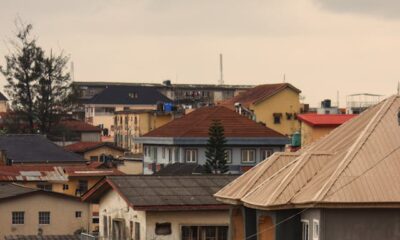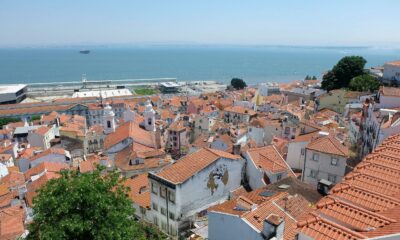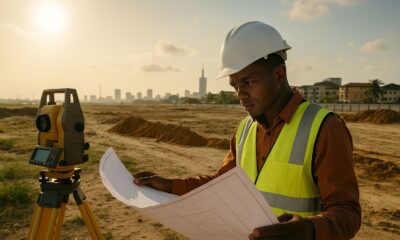Features
Niyi Ademoroti: Lagos is Trying to Kill Me
Remember the Otedola Bridge fire? Remember how at the peak of its news cycle, the state government released a statement? As a government, we would not relent in putting measures in place to ensure safety of lives and property of all residents. Remember that the state government released another statement restricting tanker routes in Lagos? What a joke. Because just three months after that tragedy, another tanker fell on the same bridge.
 I woke up a little ill on Wednesday. I don’t mean I woke up to find myself suddenly under the weather. I’d been a little ill all week. Nothing serious, just a little sore throat, clear catarrh (a good sign, according to a young doctor from my NYSC camp back in 2016—yellow very bad), a little tightness in the chest, and a slight headache that comes and goes. Nothing serious. I woke up to the illness as if it had been waiting for me beside my bed.
I woke up a little ill on Wednesday. I don’t mean I woke up to find myself suddenly under the weather. I’d been a little ill all week. Nothing serious, just a little sore throat, clear catarrh (a good sign, according to a young doctor from my NYSC camp back in 2016—yellow very bad), a little tightness in the chest, and a slight headache that comes and goes. Nothing serious. I woke up to the illness as if it had been waiting for me beside my bed.
There was the usual refusing to get out of bed, wondering if it’d matter if I showed up late to work, if I didn’t show up at all. Then I went through my morning routine—brush, bath, dress up. I skipped on yoga because, well, let’s say because I was a little ill. By 8 AM, after a one-kilometre walk, I was standing at the bus-stop waiting.
I’m only going to mention the Jehovah’s Witness preacher because he matters in what happens next. He was unsure—you could see it in the slumping of his shoulders—as he approached me and tapped me from behind. I think he asked me if I was going to Lekki. Or maybe that was someone else on some other day. Point is he made a little small talk before launching into his agenda: could he give me a copy of Awake?
Now, I usually just throw these things away the first chance I get, never read them, so I shook my head and told him, No, thank you. He smiled, I smiled, and when I was turning back to watch for a bus was when the agbero‘s kondo crashed against my head. Nobody even said anything, maybe just two people said sorry, finish.
What happened was he’d been arguing with a bus driver, and when he banged his kondo against the body of the bus half of it broke off and on its way to the floor visited my own head. If I were a superstitious guy I’d say maybe God was punishing me for not listening to the preacher. But I know God’s much to busy for s**t like that, and this one was a result of Lagos lagosing.
The same day, on my journey back home, we were stuck in traffic. Everywhere was hot as f**k. My face was gummy, sweat dripping down my back. I was sitting at that cursed seat—you know that one, the one the last person to get on the bus sits on. The one that folds horribly up and leaves you at the mercy of the conductor’s butt-crack, his armpits, crotch, breath—places otherwise private on people. That wasn’t even the problem. I was born here; I’d grown used to being assaulted by a conductor’s smell.
I said we were stuck in traffic, because, you know, Lagos. I didn’t know this until after what happened happened: the conductor was micing his ori malu on the roof of the bus. Finished, he flung it away from himself and the wind brought it back in through the window, on my shirt. The last drops spilled all over me.
***
I guess I could talk about all the structural ways Lagos is trying to kill all of us. The real ways, you know. Let’s pretend the small and daily ones don’t matter.
My friend, Timehin, gave an epic TED Talk Who Belongs in a City at the TEDGlobal 2017 where she talked about one of those ways. She discussed how Lagos, in its bid to become a megacity, the next Dubai, is pulling down indigenous settlements and replacing them with high-rise buildings. Otodo Gbame remains burned into our memories.
You don’t need to have worked in estate firms or have architect friends to know how most of the buildings in Ikoyi, in Lekki, are empty. You hear it in buses when you ride past. Properties owned by the rich, wasting away; eight-bedroom houses falling to decay.
It’s bad enough that homelessness is pervasive all across the state. What’s worse is how many more, hundreds of thousands, are being made homeless, and why: because the state government wishes to build more luxury properties, properties that will remain empty long after their owners have died. There is no provision for the working class who every day flood the city, no low-cost housing.
Homelessness can sound like just another word. It’s even a little pretty to say: home-less-ness; rolls right off the tongue. It’s nothing like murder, that heavy d sound. But isn’t homelessness a type of death? Because what kind of life is it if you have no home? There’s nothing to return to at night. Nowhere to hang your clothes. There’s no, Oh, I can’t sleep with light, where there’s noise, without a duvet—you make do with whatever you find: the dark under a bridge, the midnight quiet of the road median, the warmth of the cover of that campaign signboard.
And let’s never forget that people were shot during the land grab. People drowned. It’s not Lagos trying to kill Lagosians through legislation or slowly, it’s Lagos mowing people down with guns. It is straight up murder.
***
I’ve been working on this feature for a while at work, something called—no, that doesn’t matter. What matters is what it’s about: people who grew up outside big cities but had to move at adulthood to these cities in search of better opportunities. Of course, almost everyone I’m speaking to about it moved to Lagos.
The complaints are uniform: the needless aggression; the hustle and bustle; the crime; how there are way too many people competing for a limited space; how many people, like them, keep trooping anew into the city. (I try now, but I fail to recall what friend it was who visited home in Ibadan and returned to tell me: I’d forgotten people were kind in Nigeria. I’d forgotten not everyone wants to take advantage of you.)
The state government is constructing a BRT lane on the Lagos/Abeokuta Expressway. In its patent myopia, rather than extend the available lanes, too, or build service lanes, the government is squeezing the expressway into one lane at bus-stops and two everywhere else.
You don’t need a feasibility and viability analysis to know that a chunk of the people moving to Lagos from other states settle along that axis. But it’s Lagos; no one’s surprised that there is no consideration for the near future.
***
I decided to pay my friend Adeju a visit a night before the March gubernatorial elections. I planned to stay through Saturday, return home after the elections. Around 10 PM we realized: food. How would we eat when no one would open during elections? We filled his gas, took an okada from Glover Road to Obalende. After we bought the chicken, grounded the pepper, haggled with the woman selling lemons, we both learned of the other’s hatred for cooking. It’s just stress.
With our grounded pepper jiggling in our arms, the Maggi and salt, cold chicken, a whole pineapple, we walked inside Obalende, toward a place his mum had once taken him to eat oxtail. When his slippers cut and we stopped to buy another, I asked him if we were safe. The faces around were hard. I had my ankle beads on and had to keep picking my phone out my pocket to snooze my blaring 10 PM Xalatan alarm.
He laughed, palmed my back. “I come here all the time,” he said. “It’s very safe. In fact, I enjoy it. I like the people-watching.” I relaxed. I noticed everyone around me was minding their business. Teenage boys were gisting as they bumped past us. Women sat in their stalls, nodded their heads. Men, with shifty eyes, sat at roadside bars, drank and slapped each other’s shoulders, rubbed the laps of the women beside them. Sex workers bordered the road in their flimsy tube tops, hair cropped low, spandex mini skirts.
The food woman at the canteen asked if we wanted to eat in or take away, and my friend looked at me. “Takeaway,” I said. I’ve always found it uncomfortable, eating outside. In the words of the great Bobrisky: I’m an indoor type. Besides, the canteen was housed on the ground floor of a three-storey building that looked like it was coming down. The column, tired, had eaten into the concrete it supported. You know these buildings that need pile foundation but settle for raft because it’s cheaper. Technical stuff, sorry.
***
I was in the office, staring into my computer, when someone said, “Ah. A building with schoolchildren inside has collapsed in Lagos Island.” We grieved while we rushed to put it up on the website. Nigerians offered thoughts and prayers on social media, and those who could rushed to the scene to help.
The story continued to develop through the day and after. That’s media-speak for s**t continued to go down. But it’s easier to cope with if you distance yourself, you know, turn real life tragedy into news, statistics. Anyway, kids were rescued, kids died, Lagos lagossed. The state governor, Akinwunmi Ambode, visited the scene, promised the survivors would be treated for free. He commemorated with the victims of what he described as an “unfortunate incident.” Unfortunate. Incident. Cute words.
Maybe we could have accepted it as unfortunate—unlucky—if, scrolling through social media on Thursday night, we didn’t see something saying the building had been marked for demolition. I saw 2014, but a friend says his sister told him 2018. 2014, 2018, hardly matters. The koko is that people shouldered with the responsibility of ensuring our safety failed. Unfortunate. A stroke of bad luck. But is it bad luck if it could have been avoided if s**t had been done right?
Remember the Otedola Bridge fire? Remember how at the peak of its news cycle, the state government released a statement? As a government, we would not relent in putting measures in place to ensure safety of lives and property of all residents. Remember that the state government released another statement restricting tanker routes in Lagos? What a joke. Because just three months after that tragedy, another tanker fell on the same bridge.
***
My favorite thing about Lagos right now is how you can sometimes feel Eko Bridge vibrate under you when you drive through. It’s like jangilova – thrilling because it’s dangerous. My friend, Munachi, had to go to Ikeja for an event on a Sunday. On her way back, she was in tears at the backseat of an Uber because she’d left Ikeja at 3 PM and was just climbing Eko Bridge at six. She was exhausted. The Uber driver told her, Sorry, sorry. We all know the cause of the traffic: the tankers parked on one lane, sometimes two, down the length of the bridge.
I was nowhere near the mainland during Access Bank Marathon or when President Buhari visited the state. I sha know that everywhere on social media was photos of an empty Eko Bridge. And a day after, maybe two, our friends, the tankers, were back as if they’d never left.
Even though I don’t truly mean it, even though it’s so morbid I can’t imagine the impact it’d have, the destruction, the pain and loss, I sometimes say to myself: I wonder what would happen if this bridge comes crashing down. But I know what will happen. We’ll have it up on the site. We’ll follow the story as it develops. We’ll offer thoughts and prayers. Those who can help will. The state governor will visit. He will say it was unfortunate that it happened. They will ban tankers from roads and maybe that will last a month this time. Then we’ll move on. Because all of us are used to Lagos trying to kill us.






















